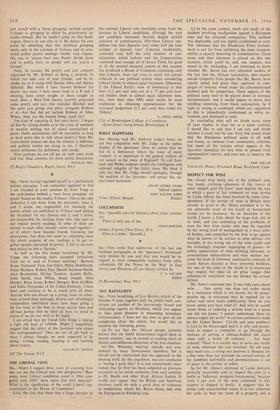THE LIBERAL VOTE • SIR, —Might I suggest three ways of assessing
how one can put the Liberal vote into perspective? How many more Liberal candidates stood in 1964 com- pared with 1959? How many lost their deposits? What is the significance of the small Liberal rep- resentation in the House of Commons?
First, the fact that there was a large increase. in
the national Liberal vote inevitably arose from the increase in Liberal candidates, although the vote per candidate increased. Second, despite careful selection of constituencies, fifty-three Liberal can- didates lost their deposits—just under half the total number of deposits lost! (Liberals, incidentally, contested only half the total number of con- stituencies, whilst Labour and the Conservatives contested near enough all of them) Third, for good or ill the present electoral system of this country has produced a House of Commons containing only nine Liberals. Seats not votes is surely the correct criterion in our political system when considering Liberal claims to almost equal treatment. Otherwise, if the Liberal Party's view of democracy is that their 11.2 per cent vote out of a 77 per cent turn- out entitles them to almost equal television time, etc., then their nine MPs must surely be most vociferous in obtaining representation for the increased proportion (1.3 per cent) who voted for 'Others.'
Aston Street, Gosta Green, Birmingham, 4










































 Previous page
Previous page